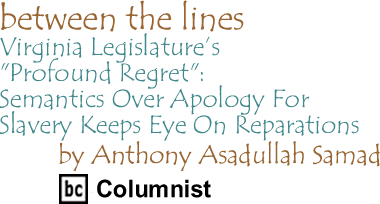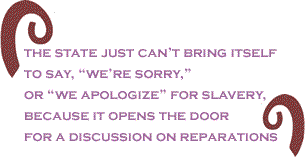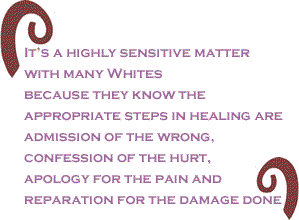
|
|||||||||||||||||||||
 |
|||||||||||||||||||||
 |
|
|
The Virginia Legislature issued a statement of “profound regret” last week over the state’s involvement in slavery, as the state prepares to celebrate the 400th anniversary of the founding of Jamestown—the first “official” colonial settlement in what eventually became British America, and subsequently the United States of America. While also condemning the “egregious wrongs” Virginia settlers committed against Native Americans, the state’s role in the start and facilitation of America’s legacy in the Trans-Atlantic Slave Trade (which ended in 1808) and institutionalization of domestic slavery (breeding slaves) from 1808 to 1865, is what has grabbed the nation’s attention. In an effort to make amends, a national controversy has been reignited. Should America apologize for slavery? The way Virginia has approached the issue, it has come very close. In what might become a “first, the States—then the nation” approach, Virginia is using carefully worded terms like “profound regret” and “egregious wrongs” to “bring closure” on the state’s involvement in slavery. However, the state just can’t bring itself to say, “we’re sorry,” or “we apologize” for slavery, because it opens the door for a discussion on reparations. The statement is purely semantics, to appease the guilt of some without admitting liability. Coming close to an apology is good enough for them, but is it good enough for us? It’s time to talk about it as “near apologies” puts semantics over sentiment on the slavery issue. Virginia had the longest slave history in British colonies, with most historians, by and large, suggesting that the first 20 enslaved Africans arrived in Jamestown in 1619 (though other historians confirm that England’s first slave voyage was in 1555 when slave trader John Hawkins brought 300 slaves to North America [Santa Domingo], causing the Spanish to ban British from trading in the West Indies). Enslaved Africans were actually on the North American continent nearly one hundred years earlier with a documented presence in New Spain (now Mexico) in the 1520s, but it’s Jamestown that is credited with making involuntary servitude an accepted part of American culture long before it became associated with the deep South. Now Virginia wants to apologize…or do they? As the House of Delegates took on the task of broaching the question of an apology for slavery, the nation got a chance to see just how far below the surface of America’s already “thin” American skin the topic is. The initial measure was, in fact, a resolution apologizing for Virginia’s role in slavery. But objections to the apology changed the measure’s tone and intent. One of its Republican members, delegate Frank D. Hargrove, opposed the measure stating that slavery ended 140 years ago and that black people “should get over” it (slavery). Black people are the only ones in the history of the world who are expected to “get over” the deconstruction of their cultural heritage, and have attempts to address the pain and repair the damage trivialized in public debate. He even went as far as to rationalize his opposition by asking if the Jews should apologize for killing Christ too, inferring that some things are best left alone. While the killing of Jesus was no trivial matter, it didn’t happen in the United States less than seven generations removed. It’s a highly sensitive matter with many Whites because they know the appropriate steps in healing are admission of the wrong, confession of the hurt, apology for the pain and reparation for the damage done. America (the nation) and White America (the culture) never wants to have a repatriation discussion with Black America. One, because they can’t return African Americans to their countries of origin in sufficient numbers, and secondly, they can’t restore African Americans to their previous culture status at the time the wrongs were committed.
Nearly 300 years of life-long servitude, by an inestimatable number, leaves America in a position it couldn’t possibly repair or reparate. And if they tried to address reparations, where would the number start? Try four trillion dollars (at last estimate, in the late 1990s), which is most of the wealth of the nation. The interest owed on reparations to descendents of slaves in America is in the hundreds of millions of dollars annually. This is not a conversation America is looking forward to, because it’s not a debt that America can pay (in dollars-but they can pay it in other ways). Now, that takes us to a decision point: does America ever want to pay reparations? The semantics that they’re playing in the apology over slavery should give one that answer. But America will never heal, racially or socially, until it’s addressed. Maybe it’s not Blacks that need to get over slavery. Maybe, just maybe, it’s time white America acknowledge the damage done and apologize, so both sides can heal. Maybe they need to get over their objection to reparations, so the vestiges of slavery can be eliminated and everyone can be made whole. Near apologies, without a sincere reparations follow-up conversation, won’t heal Blacks and it really doesn’t heal Whites. In the meantime, we walk a slow road to an apology. I went to all twelve dictionaries I own and looked up the word "apology", and in each one, “regret” was a primary or secondary definition. But the state of Virginia purposely avoided using the word “apology” because the word acknowledges wrongdoing and amends having to be made. They wanted to avoid the reparations question. And they did, for now. So, at least in the state of Virginia, it looks like we’re almost there. Almost.
I guess for now, a near apology will have to do. At least until African Americans figure out how to work around the semantics of America confessing for slavery—without paying. Anthony Asadullah Samad is a national columnist, managing director of the Urban Issues Forum and author of the upcoming book, Saving The Race: Empowerment Through Wisdom. His Website is www.AnthonySamad.com. Click here to contact Mr. Samad. |
|
| Home | |
| February 15,
2007 Issue 217 |
||||||||||||||
|
||||||||||||||
| Printer Friendly Version in resizeable plain text format | ||||||||||||||
 |
||||||||||||||
|
||||||||||||||
 |
||||||||||||||
 |
||||||||||||||
 |
||||||||||||||
| |
||||||||||||||
| |
||||||||||||||






























